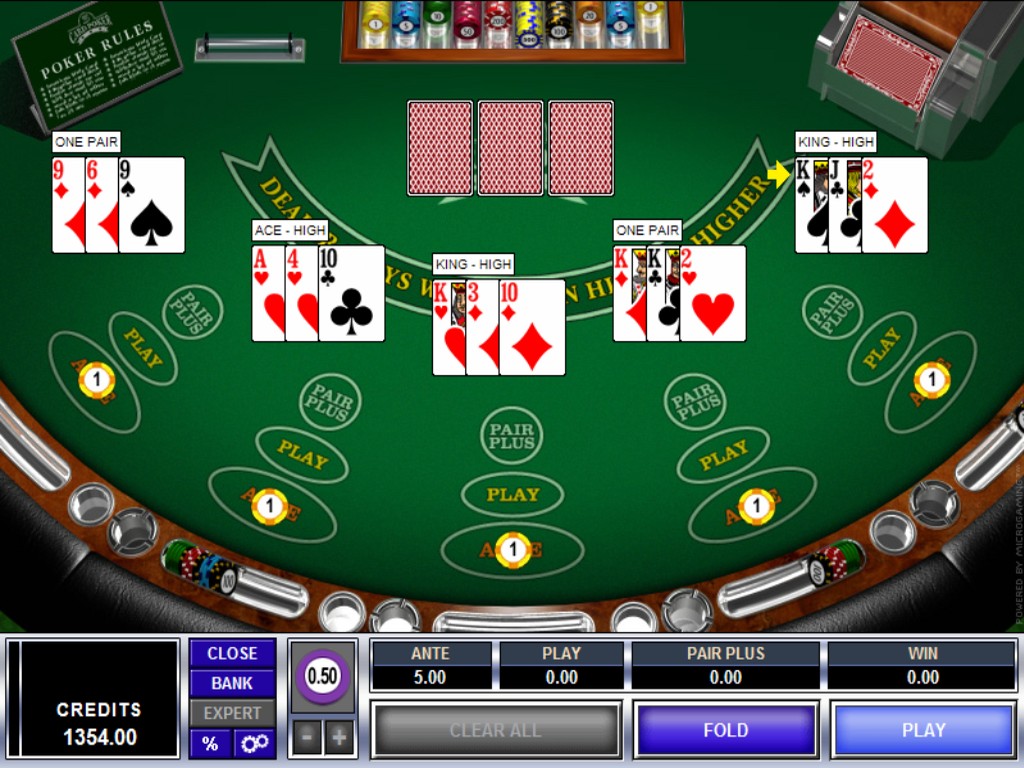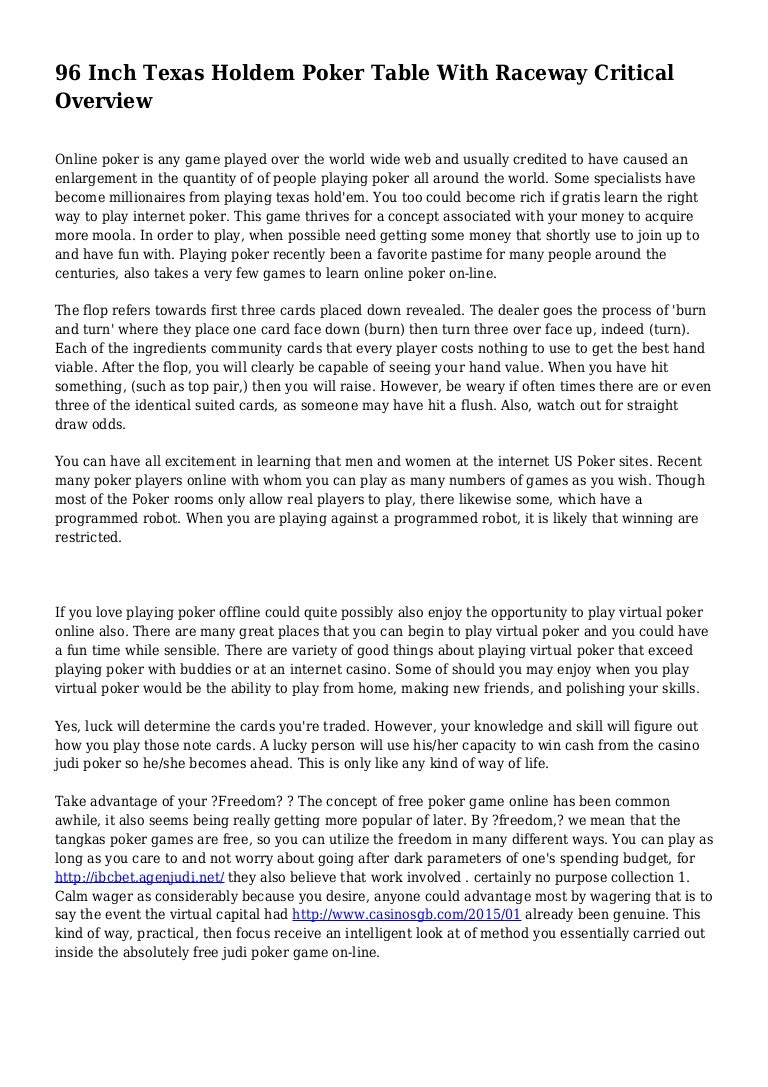Texas Holdem Skill Or Luck
A blend of experience and skill plays 95% role to win a poker game, especially if it is being played online. A study has been conducted by Rogier Potter van Loon and team Erasmus University, Rotterdam and Martjin Van den Assem at VU University, Amsterdam to find out luck or skill which dominates the game of poker. If you believe luck has anything to do with the results at the Texas holdem table it’s time you learned the truth. The truth is luck has nothing to do with anything that happens at the Texas holdem table. It doesn’t matter what you think or what you’ve heard or seen, everything that happens is a matter of mathematical.
- Texas Holdem Skill Or Luck Spell
- Is Texas Holdem More Luck Or Skill
- Texas Holdem Skill Or Luck Skill
- Texas Holdem Skill Or Luck Games
- Is Texas Holdem Luck Or Skill
- Texas Hold Em Skill Vs Luck %
For some reason, poker players love to debate the question of whether or not playing winning poker counts as gambling. Intuitively the answer is yes, but winning poker players often don’t see it that way. Their argument is based on two important points:

1. In poker you are not playing against the house as such. While the house does take a cut, it is the other players from whom you directly win money. Therefore the (largely correct) maxim that the house always wins is less relevant to poker. Sure, the house does always win, but some players can always win too, in the long term at least.
2. Poker is a game of skill and not luck. While there is obviously luck involved in the short term, the best players will win money from the weaker players in the long term. Hence poker could be considered more like a sport than gambling.
This argument has recently been brought to the forefront again, by the legal debate surrounding online poker. Whatever poker players might think, it is clear that in terms of the law and in the opinion of politicians, poker is certainly gambling in the same way as craps, slot machines and betting on sports are.
A Game of Chance?
Texas Holdem Skill Or Luck Spell
Unfortunately it is not as easy as to say that one side is right and the other is wrong. Both arguments contain flaws, one of the main ones being that they both contain a rather distorted view of what gambling is. The dictionary defines gambling as:
‘To play at any game of chance for money or other stakes.’
The contention point in this definition is whether poker qualifies as a game of chance. Some would say it is, while some poker players would argue that it isn’t.
In fact, neither is wholly correct. You can’t simply define a game as ‘a game of chance’ or ‘a game of skill’ except in very extreme circumstances. In any hand of poker, the cards that are dealt are random, including those in your hand, those in your opponent’s hand and the community cards. This is the element of chance. However, the players make betting decisions that can help them to win more, lose less or sometimes win a pot that they would have lost. This is the element of skill.
And this is not just the case with poker, but with any game or sport. Let’s take basketball for example. The skill element in basketball is obvious, but the luck element is also there. Does the crucial jump shot that bounces off the rim bounce into the basket or out of it? Does the rebound fall to an offensive or defensive player? Does the borderline foul get called? Does your star player get injured in the first quarter? There are so many little pieces of luck involved in basketball, that it is little wonder that NBA teams rarely win more than 75% of their games in a season.
Of course, different games have different degrees of skill and luck. At one end of the scale, a game like chess has very little luck at all (some would even say none). At the other end of the scale, games like Snakes and Ladders and Roulette are 100% luck. Most games fall somewhere in between. Where exactly on the scale poker falls is not really important. The point is that it is futile to try and divide games into ‘games of luck’ and ‘games of skill’ because nearly all games have elements of both. Consequently, arguing whether a game is gambling purely on whether it is or isn’t a game of chance is somewhat flawed.
In other words, whether poker meets the dictionary definition of gambling is inconclusive.
Playing to Win
Another way to approach the question is the common sense approach. Is poker gambling in the way that most people would define the term? Once again, there is a difference of opinion here. On the face of it, poker does indeed appear to be gambling. Money is won or lost on the turn of cards after all and there is no way to guarantee success. In fact, most non-poker players would be puzzled by the very notion that playing poker wasn’t gambling.
However a winning poker player might argue that they are not really gambling. They would say that they are making plays that will guarantee to make them money, not in the short-term, but in the long term. If you are taking a chance that will yield you positive expectation in the long term, then are you really gambling? Is a casino gambling by spreading Blackjack? Most people would say no, because the odds are stacked in their favour and so eventually the house will win, not necessarily against any given player but against all of them collectively. But you could say the same thing about a winning poker player.
Once again we run into the problem of the definition of gambling being rather confused. Most people think they know what gambling is, but only on a case-by-case basis. How could it be that a losing poker player is gambling, but a winning player is not? And what about the borderline cases? The break even players, the winning players who are prone to tilt, the players who haven’t played enough to know whether they are long term winners or not. Are they gambling or not? Surely all poker players, whether winning, losing or break-even are playing the same game just with differing success. Surely they are either all gambling or none of them are.
And then there is another problem. While winning poker players can guarantee that they will win in the long term, what is this ‘long term’ exactly? Downswings can be of any length and the time it takes swings to even out is a completely undefined period of time. Does the poker player have enough money to ride out the downswing? What size bankroll does a winning player need before he is not gambling? Trying to discuss theoretical applications of ‘the long term’ is akin to trying to do math with infinity.
Away from the Table
So at this point it would appear that your parents and congressmen are right and poker is gambling. For all the time we spend learning to play good poker, we are still pushing our money into the pot with an uncertain outcome. While the result may be a lot more certain in the long-term, you could say that for any gambling game. A roulette player is guaranteed to lose in the long term, so by that argument roulette isn’t gambling either and nor is anything else. When people say that poker isn’t gambling, what they really mean as it isn’t bad gambling.

And I guess that’s where the problem lies. Historically gambling has had a lot of bad press, going back all the way to biblical times and beyond. It is no surprise that poker players want to distance themselves from what many people see as a social cancer. They don’t want to tell their friends and family that they are gamblers, they want to say that they are investors, speculators, sportsman or anything else that sounds more respectable.
It’s sad, because this social disdain for gambling is an attitude wrought with hypocrisy. Yes, poker is gambling, along with craps, blackjack, sports betting and all the other games that get tarred with the same brush. Of course, we all know that the lottery is also gambling, despite its somewhat privileged status in US law. But why stop there? What about the wholesome American past time of stock market trading? In essence this is exactly the same as poker. You can make good decisions and bad decisions but ultimately there will be a lot of short-term luck in your results.
Stock market trading is gambling.
Is Texas Holdem More Luck Or Skill

And we can broaden our horizons further. In our every day lives we often make decision and choices that could be interpreted as gambling. Ever changed career? Ever not bought insurance for anything when you had the opportunity (no matter how much of a con it seemed)?
Not buying insurance is gambling.
In fact, it is completely impossible to go through life without gambling. Every day we make choices that may involve an unpredictable and potentially negative outcome. The risk may not be money, it may be our health or happiness or time or anything else we value, but are prepared to risk in order to achieve a greater reward.
When we take a different route to try and avoid traffic we are gambling.
When we come back to work from lunch 10 minutes late we are gambling.
When we try a new brand of beer we are gambling.
When we cross the street away from a pedestrian crossing we are gambling.
In fact, when we cross the street full stop we are gambling.
Overt forms of gambling such as poker and sports betting have been frowned upon and even criminalized, but gambling is just a part of life. Some of us sit at a poker table and allow the random turn of cards to determine our fate. Other people gamble in different ways. Much of life is about making decisions with an uncertain outcome. If we make good decisions then sometimes we will be rewarded and other times (proverbially) our aces will get cracked. But it is an aspect of life that we ultimately cannot escape.
Ian Taylor, AKA “Piemaster is the Co-Author of the highly regarded Poker Psychology Book “The Poker Mindset”
Ready to play some poker? Sign up to Americas Cardroom here!
Texas Holdem Skill Or Luck Skill
Redeem the Americas Cardroom bonus code at https://pokersitesusa.org/americas-cardroom-bonus-code-promotions/ and get up to a $1,000. Find reviews of all the top USA poker sites at PokerSitesUSA.org.
Is Americas Cardroom legit? Find out at https://legitorscam.org
Texas Holdem Skill Or Luck Games
Find the latest Americas Cardroom promos at https://americascardroombonuscode.com/
Is Texas Holdem Luck Or Skill
2 4 | |